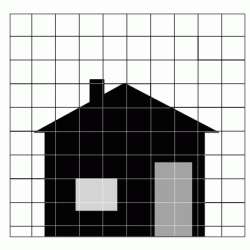Source Institutions
Source Institutions
Add to list Go to activity
Activity link broken? See if it's at the internet archive

In this pencil and paper activity, learners work in pairs and simulate how astronomical spacecraft and computers create images of objects in space. Learners will discover the process of how light collected from a space object converts into binary data and reconverts into an image of the object. This lesson guide includes background information, tips, extensions, and blackline masters.
- 5 to 10 minutes
- 30 to 45 minutes
- 1 cent - $1 per group of students
- Ages 8 - 14
- Activity, Lesson/Lesson Plan, Simulation
- English
Quick Guide
Materials List (per group of students)
- Transparent grid
- Paper grid
- Picture of house
- Pencil
Subjects
-
Earth and Space Science
-
Astronomy
- Stars and Galaxies
- Probes, Satellites and Spacecraft
-
Astronomy
-
Physical Sciences
- Vibration and Waves
-
Mathematics
-
Data Analysis and Probability
- Data Collection
- Data Representation
- Probability
-
Geometry
- Plane Geometry
- Measurement
-
Data Analysis and Probability
-
Engineering and Technology
-
Engineering
- Aerospace Engineering
-
Engineering
-
The Nature of Science
-
The Scientific Process
- Conducting Investigations
- Gathering Data
-
The Scientific Process
Informal Categories
- Computers
- Photography and Film/Video
Audience
To use this activity, learners need to:
- see
- hear
- touch
Learning styles supported:
- Involves teamwork and communication skills
- Links STEM to other topics of interest such as arts and humanities
- Involves hands-on or lab activities
Other
Includes alignment to state and/or national standards:
Includes assesments for student learning:
This resource is part of:
Access Rights:
- Free access
By:
- Vogt, Ed.D., Gregory L.
Rights:
- Public domain, ,
